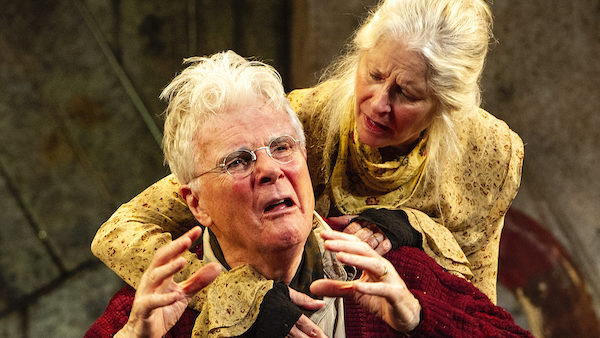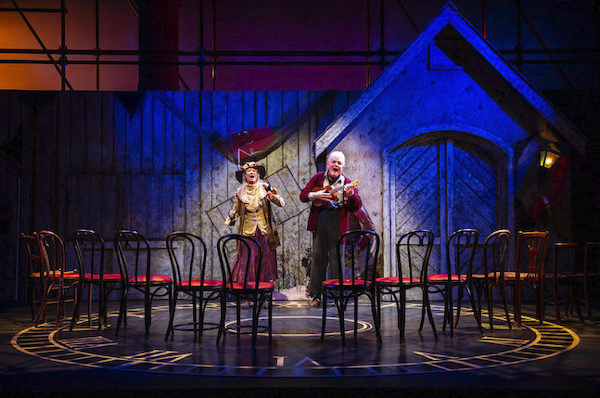Theater Review: “The Chairs” — Not a Full House
By Bill Marx
At the very least, Ionesco’s drama about the unreality of the world should produce shudders as well as chuckles.
The Chairs by Eugène Ionesco. Translated by Donald M. Allen. Directed by James Warwick. Staged by Shakespeare & Company at the Tina Packer Playhouse, Lenox, MA, through October 31.

Barbara Sims and Malcolm Ingram in Shakespeare & Company’s production of The Chairs. Photo: Daniel Rader
Is it absurd to be reassured by the Absurd? That’s the question raised by Shakespeare & Company’s enjoyable production of Eugène Ionesco’s 1952 poetic masterpiece, The Chairs. Almost 70 years after its premiere, the play’s tragicomic vision of “creatures lost in incoherence, imprisoned in a meaningless universe, wrenched from any kind of essential reality” (in the words of the playwright), holds up powerfully. And that is heartening — Ionesco’s fatalistic farce hasn’t dated. But what should a production accent: the farcical or the tragic? Perhaps square the circle and meld the two? At the very least, a drama about the unreality of the world should produce shudders as well as chuckles. Director James Warwick and his charming cast members go for the latter, so it feels as if the savage half of this play — its indelible horror of the void around us — has been neatly avoided.
The Chairs gives us a geriatric couple (the Old Man, 95 years old, and the Old Woman, 94 years old) living in complete isolation on an island. In this staging, the pair are the keepers of the isle’s lighthouse. Ionesco’s portrait of this marriage is a scathing study in doddering codependency. The Old Man believes himself to be a genius ignored; the Old Woman plays up the illusion, taking on various sycophantic roles to prop up his ego, including becoming his beloved (?) mother. (The Old Man calls the Old Woman Semiramis, the Assyrian princess who is alleged to have founded Babylon.) The time is a vague future that — thanks to the Climate Crisis — we are catching up with: there are suggestions that a hellacious war or catastrophe has decimated the planet, perhaps drowning mankind under a tidal wave. At one point, the Old Woman tells us about their son, who ran away when he was seven (“the age of reason”), disgusted by the mass extermination of birds. (The Old Man tells us he wishes he had a son. Is the kid a dream or a reality?) Underneath the comedic version of arrested development, Ionesco intimates the moral and physical degeneration of a world that is winding down. But will it die with a whimper?
The Old Man is determined to leave an articulate trace of himself behind. He has invited the Orator, an esteemed speaker, to deliver his all-important message to a party of invited guests. We hear the VIPs pull up to the dock in motorboats, but we don’t see them. The couple greets each invisible, imaginary visitor with an effusive enthusiasm that soon curdles, once the Colonel starts flirting with the woman next to him. More guests hit the beach, so more chairs have to be dragged on stage by the overstretched oldsters. The Old Man and Old Woman coo over or battle with the growing number of guests, fighting off romantic advances or remembering the good old days with an old flame. Ionesco amusingly lampoons the event as theater (“all the world’s a stage”) when the Old Woman begins hawking programs and Eskimo Pies. Finally, the emperor arrives: he’s a beam of light, so the monarch may either be a physical or spiritual presence. The Old Man and Old Woman respond with declamations of utter servility. As in Ionesco’s best known play, Rhinoceros, the enemy of the imagination is a debilitating conformity. And then the Orator speaks …

Barbara Sims and Malcolm Ingram in Shakespeare & Company’s production of The Chairs. Photo: Daniel Rader
Barbara Sims and Malcolm Ingram are a terrifically engaging pair, their Old Man and Old Woman a daffy couple whose Laurel and Hardy–inspired interactions suggest 75 years of married routine that has morphed from banality to hilarity. They perform a wonderful silly song together, and the pair are adept at physical comedy — watch their delightfully creaky postures as they lug the chairs about or chat with their guests. So there is a lot to like in this production. But neither Sims or Ingram suggests the emptiness at the heart of things. The staging’s dialogue exchanges move along at a pleasurable clip, with few attempts to suggest the terror beneath the party’s clowning. Director Warwick is content to serve the script up as a sort of weird entertainment about the psychological degradation of aging — the befuddlement of superannuation rather than Ionesco’s revelation of “the unreality of the real.”
Symptomatic of Warwick’s weak-kneed approach is how he has botched the ending of the play. In the script there’s a physical Orator. (“A typical painter or poet of the 19th century” reads the stage directions, “… just as the invisible people must be as real as possible, the Orator must appear unreal.”) His much anticipated speech comes out as a sputtering series of gurgles and squeaks. In a newspaper interview, Warwick says he believes this figure to be a “stark display of a handicapped person” and speculates that if “Ionesco was alive today, he would cut that.” Who knows? Warwick’s response is to turn the Orator into a spotlit umbrella. I do know that Ionesco would have found a much more powerful substitute than Warwick’s bewildering piffle of an ending. The dramatist’s emphasis on the sounds of chaos could have been explored with much more playfulness.
Frankly, given that this is an exercise in the Theater of the Absurd, we might have been given a chance to see both endings. We could have made up our own minds whether the original has become objectionable. A look at Google suggests that there have been no protests about the Orator when the play has been produced elsewhere. (What in the world would Warwick do with Lucky’s incoherence in Samuel Beckett’s Waiting for Godot?)
But let’s give Ionesco the final word: “Laughter … laughter … certainly I cannot say I do not try to arouse laughter; however, that is not my most important object! Laughter is merely the by-product of a dramatic conflict that one sees on the stage, or that one does NOT see if the play is a comedy, but then it is still implied, and laughter comes as a reprieve: we laugh so as not to cry.” This is a Chairs without tears.
Bill Marx is the Editor-in-Chief of the Arts Fuse. For just over four decades, he has written about arts and culture for print, broadcast, and online. He has regularly reviewed theater for National Public Radio Station WBUR and the Boston Globe. He created and edited WBUR Online Arts, a cultural webzine that in 2004 won an Online Journalism Award for Specialty Journalism. In 2007 he created the Arts Fuse, an online magazine dedicated to covering arts and culture in Boston and throughout New England.

Thanks for the sharp review. I find this fascinating. An absurdist masterpiece from the post-WW2, nuclear-bomb immersed early’50s, Ionesco may be questioning both the unkown gibberish God has handed down to humans concerning their purpose on the earth as well as judging the ridiculous humans and their baffled, babbled response. But what does the director make of this? The squawks at the end resemble the handicapped so must be excised from this politically sensitive modern version. Meanwhile, poking fun at the doddering elderly is fine! Ionesco’s vision — so often bitter, dark, humorous and humane about the bizarre parts we are left to play on earth — is seemingly diminished in this production.
Yes — we do have an example of virtue signaling here. And that goes against the critical spirit of the play, which attacks knee jerk assumptions of rectitude. As Ionesco translation Donald Watson said in a speech about the playwright: “I do not see him as a fundamental pessimist, a purveyor of despair, but rather as a figure searching that same area of truth to which so many young people today are so strongly attracted … Ionesco encourages us all to rethink our position and reassess our identity as we move into a strange new world.”